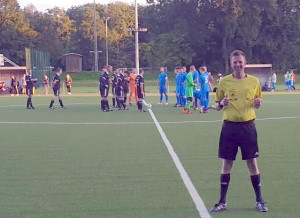 Rodion Wouters loved being a referee - rare disease makes life difficult for him...
Rodion Wouters loved being a referee - rare disease makes life difficult for him...
Rodion Wouters is 26 years young and has been involved as a referee in Wesermarsch. Whistling for SG Schwei/Seefeld/Rönnelmoor since 2010, many only know him as “the Dutchman”. "If there was a way, I'd love to stay a referee," he says. Unfortunately, a very rare disease called"Chorea Acanthocytosis" is progressing inexorably and makes it hard for him to stay in his beloved position on the field.
It is estimated that only 1,000 people worldwide are affected by the disease. Beginning in early adulthood the first signs of the disease are often cognitive and psychiatric symptoms. "That's why I stand out on the field with my striking movements and a striking running style," says Rodion Wouters.
The treatments are aimed solely at the symptoms, the disease progresses relentlessly in those affected. "That makes whistling very difficult for me," says the 26-year-old, who lives in Brake. Concentration problems do not make it any easier for him either.
His passion for refereeing at youth matches began in 2010. At a certain point, men's competitions followed and Rodion Wouters was often on the road as an assistant. “I kept all the game note cards,” he says.
Wouters turned to Sportgasm with his challenging story to encourage others to show up despite illness. Already, his movements had people asking him if he would whistle drunk, which, of course, he wouldn't. "I've always believed that you shouldn't let yourself be told you can't do something if you really want to." he explains.
His will is still there, but now the disease has progressed to the point that a return to the field is unlikely. In any case, our team wishes Rodion all the best!
Note: This article appeared online in German on April 9, 2022. Here is the link should you want to read the article in its original language: When Health No Longer Cooperates .
[NA News editor's note: Estimated prevalence of the disease is 1:1,000,000 and initial symptoms vary among patients.]
